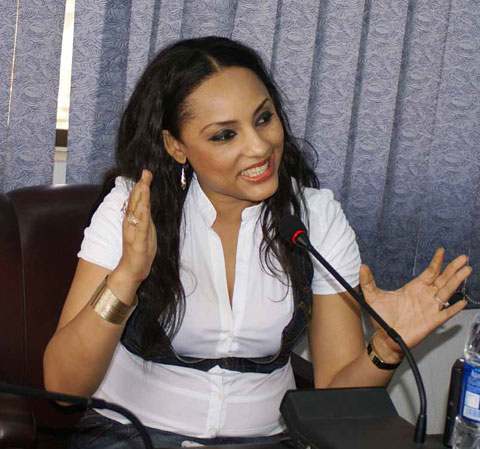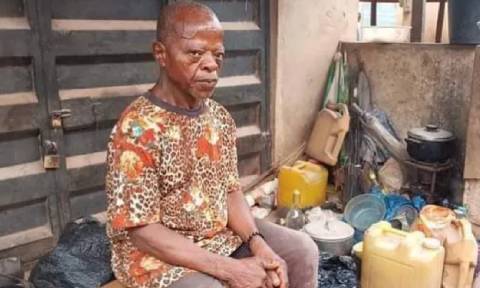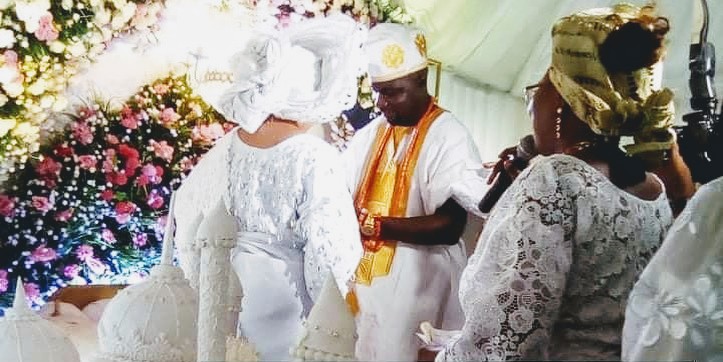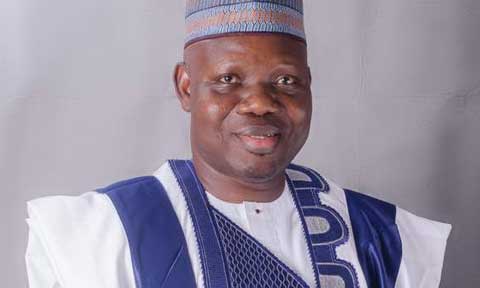• In primary school, I fell in love with my teacher and when she was getting married I boycotted her class out of jealousy
Olu Jacobs is a household name in the world’s 2nd largest film producing industry, Nollywood. He has maintained a great reputation for high standards, morality and, is no doubt, respected for this.
Recently, Jacobs told Saturday Sun what could pass for his love story. He revealed how, a pupil, he fell in love with his primary school teacher and boycotted her class, out of jealousy, when he learnt she was getting married.
He said: “I remember when I was in primary four, I fell in love with my class teacher and the day she came to our house to introduce her fiancé to my parents she never saw me in her class for another term. I was going to school but after the assembly I would refuse to go the class. And I did that for a full term. I never went to her class because I was excessively jealous.”
The ace actor spoke on this and other things.
Greatest challenge in acting
It happened in a movie called Pirates, written by Romand Polasky. We were on an island in India, in a location. And I was supposed to go after the people who kidnapped my captain; we were pirates and I was going after them to save my captain. I was coming on and suddenly there was this deep gorge about half a mile deep. I was to run round and get to the edge of the gorge and start jumping, I was really scared; even as I am telling you I am scared, because I can see the gorge. I can imagine the rest; if anything happened to me nobody would have been able to pick anything because I would have become powder. The whole place was rocky. But that was something that had to be done. It was in the Indian ocean, at the capital of Mumbai, in 1984. Before getting down, I knew I was going to jump but was also sure I would not jump forward. So, when I got close to the edge I started jumping on the spot and backwards. My director was not afraid; he got to the edge and was jumping.
My regret about Nigeria
I regret that we had an opportunity that we did not take advantage of. When the oil boom started, the Arab country began to buy property in Europe and America and we thought they were mad; we were hiring and spending money as if there was no tomorrow. Statement like money is not our problem was what started our disaster; look at the Arab countries today. Even with all the wars they have fought, look at what they have been able to build; our Abuja was just reconstructed some years ago. We hardly had any government; the military had no experience of government; we just gave them the opportunity to squander our wealth. And about two generations suffered for that. See how hard and costly it took us to buy our place in New York; some people wanted us to buy it that time, but some said no way, asking what we were buying it for; we rent and we would be maintaining it. Look at what it is today; all our foreign offices and building would have had money to fund themselves because they won’t have the cause to rely on budget because they would have made their money at that time.
But all the same, we thank God; He has been so good to us. When we think that some people have destroyed Nigeria we found that it rises again.
What childhood experience inspired what you are doing now?
I was brought up in Anglican. I was a serious member. I was serious as a Christian. Even as a small boy, I tried to fast. I had Bishops and Archbishops as friends. My parents were Anglicans and my other relatives were of the Cherubim and Seraphim Church. They had annual church programmes, where they presented songs and a lot of dances. And usually, it was why only the girls who danced until I joined in. I told my mother that I could dance; she told my father and when he finally believed, he told them at the church that his boy could dance. So, out of 16 dancers in the church, I was the only boy. So, the choir agreed and to their surprise I danced so well. At that time, they would come to the stage and give performers money. They would touch the particular performer and drop the money. So, you know who the money was for. And I was getting a lot of money then.
Later, when I began to see stage performances, I began to feel like being part of it. A major influence was the presentations of the Ogunde Concert party. It used to be an itinerant production company then. When I first saw their performance, my friends and I had sneaked into the auditorium. When we got in, they haven’t started performing. The whole place was jam-packed. Everywhere was lit up, but suddenly the lights went off, and then spotlights came on. There was music and dance; what Ogunde used to call opening glee. With the songs and dances, the whole place exploded. And somehow, even at that tender age, I was able to detach myself. I looked at all the performers, may be one or two of them were my age mates. They were all happy because the songs and dances were coming from the inside.
Then I said to myself that I loved that and would do it. I did not know how I would do it, but I just had the hope that I would do it. So much later, I eventually made up my mind to go to England to read Performing Arts. I bought an application form and filled it and gave it to my dad; he tore it and I bought another one. This time, I told an uncle to intervene. I filled it again and gave it to him. He just signed it and kept quiet. Then I went for my passport; went also for interview and brought my visa. I left him; he didn’t know. I took a train to Lagos and from Lagos I travelled to London. When I got to London, I sent a letter I had written to him through someone who was going home. He was a piper; so I also bought St Bruno cigarette, a beautiful one, and I sent it with the letter. I told him that I had gone. I apologized and said that I wanted to do what I desired and that I knew that he would not allow me to do it. I was told he was upset until he was told about the tobacco. He looked at the tobacco, opened it, emptied his pipe and filled it and drew its smoke, and his heart was melted. Three or so days later he called my mum and said they should pray for me.
How much are you paid for being part of a movie?
That is confidential; it is between me and the producer or director. If he chooses to go and tell anyone about it he knows it would be too bad.
What qualities endeared you to a script?
When a script comes, I try to read it first to see what is needed to be done and how to do it.
You and your wife are into acting and are always busy. How do you cope?
We manage; we have househelps, and we understand each other.
What legacy do you want to leave behind and how fulfilled are you on what is on ground in Nollywood?
We haven’t got what we expected. We have no support from the government, but I think they are now realizing the benefit, now that the World Bank has carried out a report and confirmed that we are the 2nd largest.
So, who is getting the money?
They want to know; that is why they have started the distribution of licences. We are not going to retire; we shall contribute to work. I have been in this business for more than four decades. I am still passionate about it, because it is a serious business. We know it and try to communicate it. I would like to be remembered as someone who has tried his best and to be judged by observers, whether it is good or bad. We are happy today that things are moving although slowly.
Why did you relocate to Asaba?
When movies were being shot in Enugu, we moved to Enugu and the people thought they had a divine right to it. However, there was a lot of insecurity and armed robbery. So, we decided to find a peaceful place and Asaba is one. It is accommodating and warm.
What do you think about the conflict between the ANTP and AGM?
They are all Nollywood, but this conflict would always happen because ANTP is older than AGM; we all know that they have been there. It is only fair that they should have a voice. But what they have to do is to unite. And I think the respect is growing for each other now. It was not there before, as one was looking down on the other. The market is beginning to prove that, may be, the Yoruba film is not so bad. You know the yardstick is how much is realized.
Have you ever had an embarrassment that could have made you to leave Nigeria?
I lived in England for 20 years and I operated there for that long. When I decided to leave, there was no urge to go back there. I have come for better for worse. It is my country; there is nothing they have in England that I don’t know in every area of this industry. The only time I feared that I was going to be embarrassed was when I acted as custom officer in the Dogs of War. In the movie, I played a role as the corrupt custom officer and there was a traveller who I shared every thing he had with: his money, tobacco, and everything. When I got to Nigeria I was in trouble. One of the officers looked at my passport and said: “Oga na you”? He called a police officer and I thought I was in real trouble. But when the OC came, he told him: “Oga that movie wey we watch na him be this.” The other man got so excited and hugged me and we talked, had drinks and they did not even touch my bag.
Why are marriages crashing in Nollywood?
That is because we are always in the papers. You find that what we do becomes news. Sometimes we forget that we no longer belong to ourselves; that we now belong to the public. We have invaded the public and so we have to be careful with what we do. But sometimes we are careless. And this is even overblown in the media. Marriages of people in other professions, like doctors and others, do crash. But because we are the people they see I think that is why it seems bigger than how it actually is. As for me, I thank God; it has been 24 years since I got married. I married late; we have our arguments. She is a human being, like me. That is why I said she should use her name, Joke Silva, though she is Mrs. Joke Jacobs, as my wife. No one can take that away. But she needs to have her own pride, not about her family now. Does anyone know Elizabeth Taylor’s husband, Richard Burton? So, those who were just attacking her around the eighties did not understand. My wife has to retain her own personality, so that she can equally maintain the relationship I have with her.
If you were asked to shave your hair and beard for a movie, would you accept?
We would have to discuss it. If it is necessary and the character is so important, I would do so. I work constantly on my voice because it is the tool with which I convey the message. It is with it you manipulate your words, apart from the way you look as an act. What comes out is very important and the way it comes out.
What national honour or portfolio would you like to have?
You decide that on your own.
Can you remember your most memorable day?
The day I asked my wife to marry me remains my most memorable day. It was in Tunisia, at a special outing in a restaurant, where we were served meals cooked in clay pots. I knelt down on the floor to do it and it was so extremely emotional. We had dated for four years before then.
What is the most valuable asset in his wife?
That girl is a wonderful girl. She is so loving, caring and very motherly. She is also highly industrious.
What is your greatest regret in life?
My greatest regret is that I did not meet my wife earlier than I did. I was 39 when I met her and discovered that she had all that I wanted in a woman. I was not in any serious relationship when I met her. But I did not even want to marry. And I never wanted to marry a white woman. I wanted a Nigerian.
How would you react to the kidnapping of actors?
We are just actors depicting life; we are not adequately paid. I think money is the only reason for the kidnapping. It is the information that is being carried on tabloids and papers that these actors are rich. Kidnapping is becoming a serious issue. It is not funny any more. It is all the fault of the actors giving an impression of being bigger than what they really are through the media; they have been presented bigger than what they really are. And these guys are unemployed and they read in the papers that the actors have hit money. Kidnapping is really not a good thing; it is really not good. There is no need for it.



















